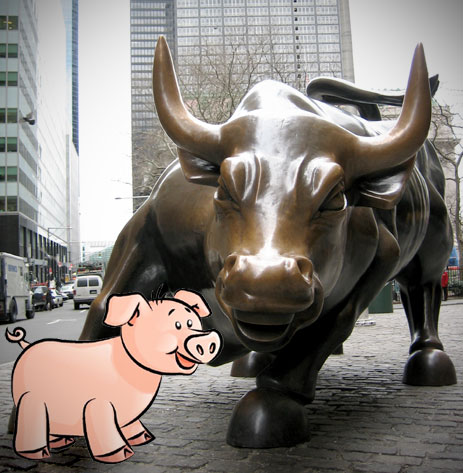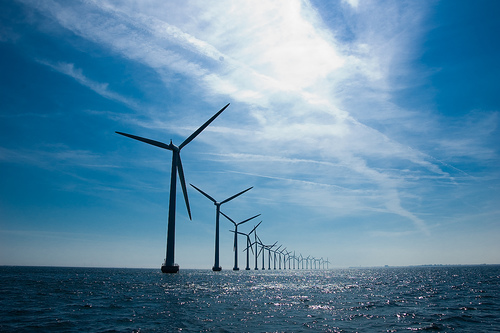Wall Street
-
Wall Street and ethanol cause starvation, say scientists
Today's supervillains are soooo boring. If only they'd wear tights and touch entrapped damsels’ hair in a way that made us uncomfortable, we'd be up for patriotically pistol-whipping them, Captain America style. Instead we find out that Wall Street and ethanol -- a diffuse network of trading computers and a colorless inebriant, respectively -- are the reason billions are going hungry in the developing world. How are we supposed to launch a hideously expensive vendetta-war against that?
-
How to fork Wall Street over
Where does food fit into the Wall Street occupation? From the pizza deliveries to the impact our banking system has on agricultural policy -- we used Storify to compile the latest!
-
Financial-reform bill limits the speculation in ag commodity markets that sparked food crisis
While we mourn the dead climate legislation, it's worth noting that something non-hideous emerged from Congress last week. Buried within the financial reform bill, there's a set of provisions that evidently limit excessive speculation in ag commodity markets -- something that drove more than 100 million people into hunger in 2008.
-
If JBS gobbles up Smithfield, three companies will own U.S. meat market
(Grist illo; Carlossg/Flickr) A typical supermarket’s meat counter displays a landscape of easy bounty: shrink-wrapped chops, cutlets, steaks, roasts, loins, burger meat, and more, almost all of it priced to move. But the dizzying variety cloaks a disturbing uniformity. As the chart below shows, the great bulk of the meat consumed in the United States […]
-
500 Words for Change in America
Folks across the country know something is wrong. There’s just something about the system we’ve created over several decades that is inherently flawed. Some blame the government, others big banks, still others blame political parties, but all agree that there’s something that’s just not quite working the way it should. People are losing homes, jobs, […]
-
Investment rushes into wind, but can we make it last?
By Yael Borofsky and Jesse Jenkins, originally posted at the Breakthrough Institute “The money is coming back” That’s what Ethan Zindler, head of New Energy Finance Ltd., proclaimed to the Wall Street Journal in response to emerging evidence that the government’s $3 billion dollar cash grant renewable energy stimulus program is successfully incentivizing private investment […]
-
What stops us from acting more boldly on economic and environmental policy
[Note: Since comments are turned off, if you have thoughts, email me at glipow AT gmail.com. ]
A lot of energy is expended on Grist showing that good environmental policy is good economic policy -- to show that green pays. But it is just as important to show the same thing from the other direction. Economic policy will only pay if includes strong environmental features. Let's look at the current responses to our economic crisis from that perspective. We'll start by comparing what we are doing as compared to what we should be doing, and then move on to explaining the difference.
Let's start with the economic stimulus package that was just passed. It is not nearly big enough. It was structured on fighting a smaller unemployment rate than we already face, let alone the rate at which unemployment will peak. Those radical leftists in the World Bank are noticing that the recession is worldwide, which would indicate a deeper recession than Obama's stimulus was intended to fight. Though you would not know it from the corporate media, quite a number of respected economists predicted from the beginning that this was too small a stimulus. Even intelligent conservatives are starting to say we need a second, bigger stimulus.
Where to put the money from a second stimulus? Keeping public transit going, which otherwise loses subsidy revenue during downturns, gives a double return in not only saving jobs and demand that would otherwise collapse, but also reducing oil use, greenhouse gas emissions, and traffic congestion. In general, making up for losses in state and local revenues reduces pro-cyclical job losses that otherwise make a recession worse.
But we have good reason to consider long-term investment in infrastructure as well. Much necessary infrastructure spending is "shovel-ready." For example, suppose we decide to put $450 billion into upgrading our freight rail system to move 85 percent of long-haul trucking miles to rail? We can invest immediately into the planning this will entail. And we can stockpile parts and materials we know this upgrade will require. And we can implement already proposed unfunded short-term projects that will be needed components of such an upgrade: new switch yards, new freight yards, and various other log-jam breaking proposals.
-
The economy needs to be green to be 'fixed'
As is often the case, The New York Times serves as a good example of the mistaken assumptions underlying conventional wisdom. In his Sunday Magazine cover story, "The Big Fix," Times economic columnist David Leonhardt combines many of the misconceptions surrounding the idea of "green jobs." As I fretted in a previous post, some writers, including Leonhardt, seem to be setting up some sort of cosmic battle between green jobs, cap-and-trade, and economic growth:
Of the $700 billion we spend each year on energy, more than half stays inside this country. It goes to coal companies or utilities here, not to Iran or Russia. If we begin to use less electricity, those utilities will cut jobs. Just as important, the current, relatively low price of energy allows other companies -- manufacturers, retailers, even white-collar enterprises -- to sell all sorts of things at a profit. Raising that cost would raise the cost of almost everything that businesses do. Some projects that would have been profitable to Boeing, Kroger or Microsoft in the current economy no longer will be. Jobs that would otherwise have been created won't be. As Rob Stavins, a leading environmental economist, says, "Green jobs will, to some degree, displace other jobs."
Later in the article, he kinda sorta argues that this might all be necessary in the long-term .. but first, let's deconstruct his arguments.
-
Seven post-financial-crisis opportunities for healthier economies
Are there silver linings to the dark cloud of the financial crisis? It is a truism in our politics that only a crisis produces real change. So, looking on the positive side, what might we hope this crisis will bring forward? Here are seven outcomes worth seeking: 1. For decades, anti-regulation market fundamentalists have argued […]



